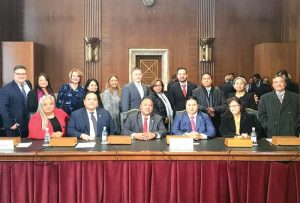Kilili hopes US Senate acts quickly on CW bill

Gov. Ralph DLG Torres, Tinian Mayor Joey Patrick San Nicolas, Rep. Angel A. Demapan (R-Saipan), Labor Secretary Vicky Benavente, and members of the Northern Marianas Business Alliance Corp. have their picture taken following the U.S. Senate Energy and Natural Resources Committee hearing on S. 2325, the Northern Mariana Islands U.S. Workforce Act. (Contributed Photo)
Delegate Gregorio Kilili C. Sablan (Ind-MP) said it would be ideal if the U.S. Senate could act quickly on the CNMI-Only Transitional Worker program extension bill so that the bill could move through U.S. Congress faster.
During his opening remarks in yesterday’s public hearing, Sablan told U.S. Senate Committee on Energy and Natural Resources chair Sen. Lisa Murkowski (R-AK) that he hopes the U.S. Senate could act quickly on S. 2325, Murkowski’s bill to extend for 10 years the transition period of the CNMI, effectively extending essential programs such as the CW program and the E-2C program under it as well.
“My hope is that the Senate would act so quickly that the [legislation] hearing at the U.S. House would pick up chairwoman Murkowski’s S. 2325,” he said, adding that the U.S. House is looking to conduct it’s own public hearings sometime near the end of February 2018.
Sablan on the same day of S. 2325’s introduction last Jan. 19, 2018, simultaneously introduced H.R. 4869, which is the same bill, to the U.S. House.
Sablan explained that the rush to pass the bill was to cater to the permits that would be cut by the 2019 CW program cap, since U.S. Citizenship and Immigration Services set it at 4,999 for this coming fiscal year 2019; a nearly 5,000 reduction in permitted slots.
The CW program allows permits to be renewed at least 180 days, or six months prior to the new fiscal year, meaning come April 1, 2018, only 4,999 of the previously 9,998 for fiscal year 2018 would be approved–not including those who wish to work in the CNMI for the first time.
Sablan specified in his remarks that suddenly implementing massive cuts to the foreign workforce of the CNMI would have immediate grave effects on the economy, especially since it is now “flush with growth after many years of decline.”
“…[U.S.] Congress works well against a deadline; and I believe we could move quickly now,” said Sablan.
Gov. Ralph DLG Torres said in his statement that based on USCIS statistics, vital occupations usually taken up by CW workers have steadily been reducing as the Commonwealth government exerts efforts to reduce reliance on foreign labor.
“In fiscal years 2012 and 2013, the top two job classifications listed were for marketing and sales, and food service occupations. In 2016, the two top jobs were in construction and building trades, which speaks toward the growth of our economy and the demand for new construction. Since 2013, Northern Marianas College successfully launched its four-year bachelor’s degree in business with training in accounting. This timeframe saw accounting positions in the CW program fall from the eighth highest in demand to 15th in 2016,” said Torres, adding that the CNMI has made gains toward reducing the reliance to foreign labor workers since the “beginning of the transition period.”
In her opening statements, committee chair Murkowski said that while she believes that S. 2325 is a “good product,” she made clear that it is called a transition period for a reason.
“…While I am willing to support extending the transition period, I remain committed to the intent of the transition, which is to increase the number of U.S. workers in the CNMI economy while reducing the dependence on foreign labor,” Murkowski said.
The committee Ranking Member U.S. Sen. Maria Cantwell (D-WA) said in her statements that the she and the bipartisan, bicameral working group led by Murkowski and included Sablan and Torres has been working over the past year on a “longer term solution to the expiring CW program.”
“This bill [S.2325], in my view, effectively promotes continued economic growth for the Marianas, but also imposes additional safeguards to make sure that protections are in place for workers. Those who mistreat their employees will suffer the consequences,” she said, voicing her support for the labor protection provisions in the bill.
“The federal government must ensure that the Northern Marianas has the tools to grow its economy while at the same time ensuring protection of fundamental labor rights,” she added.
David Gootnick, Governmental Accountability Office director of International Affairs and Trade, said in his statement that as previous reports from the GAO supplied, the CNMI is heavily dependent on foreign labor.
“We found that the number of unemployed domestic workers in the CNMI, estimated at nearly 2,400 in 2016, was insufficient to replace the foreign workers who had CW-1 permits,” he said, adding that the CNMI Gross Domestic Product for 2015 minus the CW-1 workers in 2019 would yield to a drop of 26 to 62 percent.
According to Murkowski, the hearing yielded good testimonies.
“I think we’ve recognized that the CNMI has come a long way over the years in terms of labor practices,” she said, concurring with Sablan, who mentioned that a change of dynamic has occurred pertaining to the hiring of U.S. workers.
“I feel that we are on a good trajectory here. It is my hope that we could address this issue soon because as we have been told by Dr. Gootnick, in terms of the numbers and the applicable visas that are out there…get snapped up pretty quick here,” she said, adding that these were issues that her committee would like to continue discussing with to find “good, solid solutions.”



























